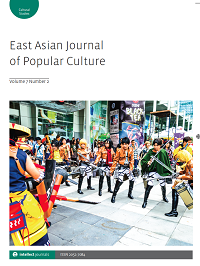
Full text loading...

K-pop content is generally associated with romantic love, immaturity, synchronized dance choreographies, attractive performers and globally fashionable pop music. However, over the last years more variability in regard to lyrics and music, partly linked to increased artistic agency among some entertainment companies, has been manifested. In this article, I have analysed how the cultural concept of han (associated with grief or resentment among Korean people) is expressed among groups and artists like BTS, (G)I-dle and Luna/Jambinai. The findings indicate that han in such discourses, while sometimes implicit rather than explicit, expresses lost love, the transgenerational understanding of Korean grief, or an appeal to the collective feeling of vulnerability among global audiences.

Article metrics loading...

Full text loading...
References


Publication Date:
https://doi.org/10.1386/eapc_00018_7 Published content will be available immediately after check-out or when it is released in case of a pre-order. Please make sure to be logged in to see all available purchase options.